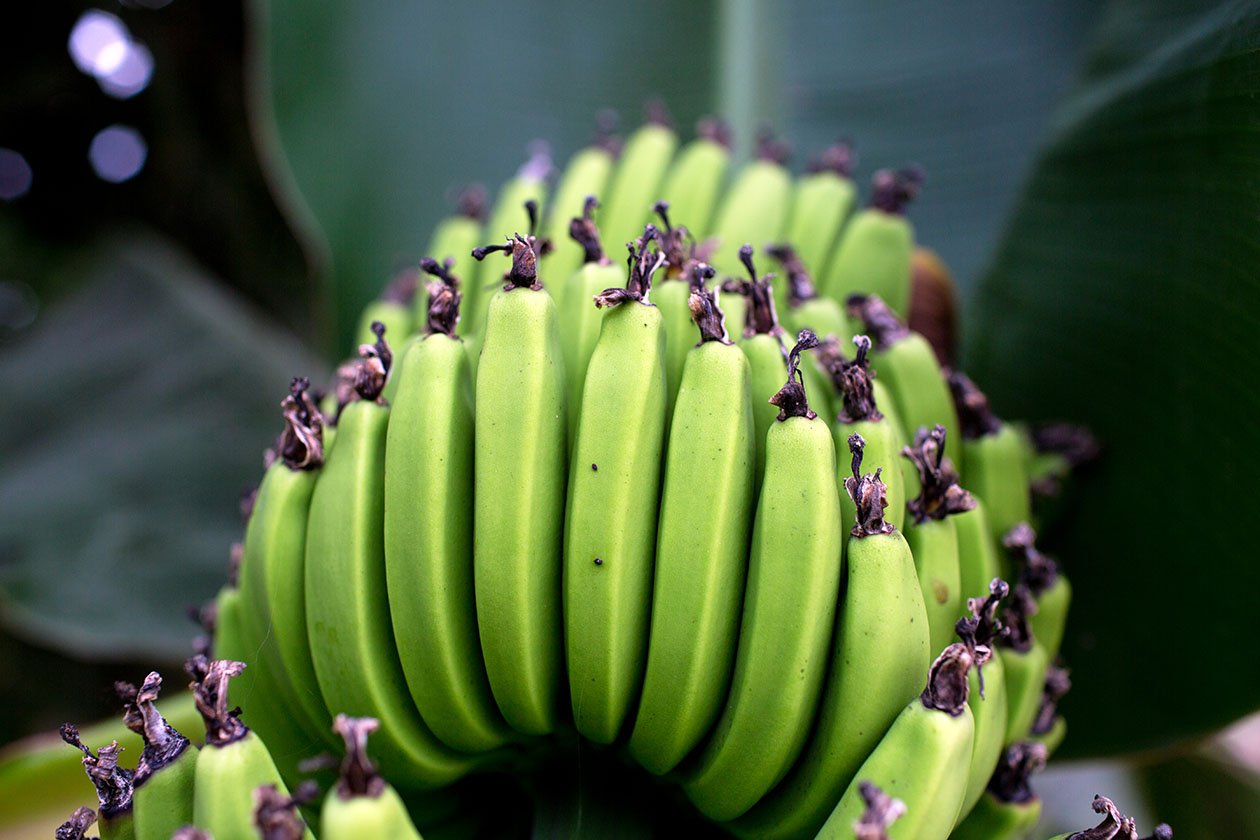Homegrown Bananas
Shortly and unexpectedly after this story was published, Canada Banana Farms posted a message to their Facebook page to say they were permanently closed.
On a concession road deep in Huron County, about two hours due west of Toronto, you’ll pass many well-established farmsteads. Often referred to as Alice Munro Country, the writer's birthplace and the subject of her prose, this neck of the woods is characterized as rural and conservative, with ingrained farming practices and stalwart beliefs.
Visitors arriving at Canada Banana Farms drive up a lengthy laneway posted with “No Trespassing” signs, past cords of stacked wood, ending up at a large modern brick house. To the right of the circular drive are three hoop houses and a view of an expansive field and large woodlot.
Inside the main hoop house, a path follows the perimeter of the tunnel-shaped, 30-foot by 100-foot structure. Surrounded by exotic plants usually found in more temperate climates, Canada Banana Farms proprietor and farmer Laurie Macpherson is busy planting organic vegetables for harvest this winter. It is a balmy 25C inside. The dome-like structure maintains conditions favourable for growing tropical fruits even during the brutal Huron County winters. Heated by a combination of hardwood and propane, the humidity reaches 85 to 90 per cent, creating a tropical landscape inside.
Terry Brake first suggested that Macpherson try to grow bananas after he received a banana plant as a form of therapy. Brake, a single father of two daughters, was unable to continue working as a mechanical engineer after a car accident left all three with serious injuries. His daughters, more seriously injured, still need physical rehabilitation.
During Brake’s convalescence, his doctor gave him a banana plant to help him cope with his inability to work in a job he loved. He nurtured the plant to fruition. It germinated the idea of growing tropical fruit in Ontario — one he passed on to Macpherson. Macpherson, who was hired as a professional caregiver for Brake and his daughters after their accident, was willing to give it a try and bought land in 2010. Brake volunteers his time in the operation, which includes taking care of the plants. On social media and among the locals, the farm became known as Canada Banana Farms and it enjoyed its first harvest five years ago.
Growing organic tropical fruit — using sustainable farming practices in hoop houses — has generated plenty of attention and speculation in Huron County, both positive and negative.
When it comes to the media, Macpherson says reporting on the operation has never been accurate. Considered “outsiders,” she and Brake feel the tight-knit farming community has not fully accepted them.
As tropical fruit farmers, they have had to deal with local resistance. Part of the opposition facing Macpherson, Brake feels, has something to do with ingrained ideas of gender roles. Beyond that, there have been legal battles over converting some of the farm’s woodlot to agricultural use. There have even been questions about whether hoop houses, for bureaucratic purposes, are permanent or temporary structures.
No easy thing, trying to implement pioneering ideas in the face of entrenched farming conventions.
Initially, when Brake helped Macpherson sell product in the region’s farmers’ markets, he was met with skepticism. “No one believed we were growing bananas,” he explains. Surely, he was reselling fruit from the Ontario Food Terminal in Toronto.
Inside the hoop houses, the eye and the nose, for all the world, could be in the tropics. Brake points out a banana plant with a hearty tree-like stem and an outer layer of branching leaves; at the top, there are bunches of pristine green bananas, properly known as hands and there's a crown of oval green leaves. Brake calls attention to the bud of a passion fruit about to flower. Soon there will be hundreds of passion-fruit blossoms with their intoxicating scent.
There’s more — an Apple mango and a Caribbean Julie mango, exquisite fruit sold at farmers’ markets in and around Toronto. “I could offer a thousand mangoes and it still wouldn’t be enough,” Brake says.
Ever knowledgeable and down-to-earth, Brake picks leaves from citrus trees and tears them a bit to release their fragrance. Lemon leaves, he says, are reputed to have “the happiest smell in the world,” with a potency that feels nicely sharp in the nose. Lime leaves are milder yet aromatic and refreshing. There are also shrubs of green Pink Lady guava, which have a coral-coloured interior, taste of melon and have the texture of kiwi fruit. Lemongrass, a culinary and medicinal herb with an understated citrus flavour, has become a coveted farmgate specialty.
Suspended overhead, clusters of ripening green papayas push out from the main trunk. “This particular variety tastes like chestnut,” Brake explains. The sample he picks up from the ground reveals a creamy interior and butter-like colour. Other palm-like papaya trees offer Red and Super Dwarf varieties.
He points to a Sugarload pineapple, a spikey plant looking much like a bromeliad. Though small and deformed, he insists the fruit will have a superior taste.
There are banana leaves on the ground. Brake explains that a friend recently arrived from Jamaica told him they were better used on the ground than in the compost pile because they create ground cover and keep the soil hot. Loaded with potassium, they also provide nutrients to the plants and keep weeds away.
Bananas are botanically berries. Each plant is propagated from off-shoots of a mother plant — which can be a source of vulnerability, since they are genetic clones of one another, all susceptible to disease when attacked by fungi.
The mainstream Cavendish banana is now under severe threat — but you won’t find any Cavendish among the seven varieties grown at Canada Banana Farms. Guineo and Lady Finger are small disease-resistant bananas, sweet and about one-and-aquarter inches thick. The Ice Cream and Honey bananas have a creamy smooth consistency. There are Bertha bananas, but also larger Big Berthas, which grow up to 300-strong on a 15-foothigh plant.
The Guineo seems a likely successor to the Cavendish, a role it shares with the smallish Thai banana.
“We prefer the more manageable-sized varieties, which are easier to harvest and store,” Brake says, with Guineo, Big Bertha and Ice Cream the big sellers.
With a developing horticultural instinct, they graft different banana cultivars to others. Brake enthusiastically points out a double flower, comprising both Lady Finger and Ice Cream varieties. The purplish leathery thyrse, hanging off the plant, will eventually curl back and expose white flowers, followed by hands of developing bananas that will ripen after two months.
Both his daughters still require ongoing rehabilitation therapy. Brake has met some of the expenses with his insurance settlement, but the bills keep coming. For now, he finds solace among the banana plants.
Macpherson holds farmgate open houses, which she promotes on the Canada Banana Farms Facebook page. The events have attracted up to 1,200 people and they sold over 500 pounds of bananas during a recent open house.
Busy as they are, they still have their eyes on further innovation. Soon other exotic fruits such as soursop, blood orange and coconut may stake their claims in Huron County.
With her determination, patience and business acumen, Macpherson has proven she can run a farm and stand her ground for innovation and change.
Canada Banana Farms
38926 Moncrieff Rd., R.R. #3, Blyth, Ont.
facebook.com/canadabanana.ca











